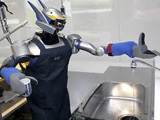|
|
TODAY.AZ / Weird / Interesting
Kitchen robots learn to be more human
02 July 2011 [12:27] - TODAY.AZ
 For your average robot, chess may be easy compared to simple everyday activities like frying a sausage, but that may be about to change thanks to software being developed by scientists in Germany.
For your average robot, chess may be easy compared to simple everyday activities like frying a sausage, but that may be about to change thanks to software being developed by scientists in Germany.Researchers at the Technical University in Munich are using complex algorithms to teach robots to learn from their mistakes and perform routines humans can do in their sleep.
The aim is to instill perception, manipulation and reasoning capabilities, enabling the machines to learn from their own experience and taking them a step closer to developing the self-awareness that so far has been reserved for humankind.
That process "demands that ... they can foresee the consequences of their actions before they actually jump into action," Michael Beetz, professor of computer science at the university, told Reuters.
"We can say that the robot is supposed to push a spatula under a pancake without damaging the pancake."
Calculation models and controlling mechanisms programed into the hardware help robot TUM-Rosie understand the nature and function of the cooking spoon it is handling, while TUM-James uses real-time sensing to do things like slice bread.
/Reuters/
URL: http://www.today.az/news/interesting/89686.html
 Print version
Print version
Views: 2888
Connect with us. Get latest news and updates.
See Also
- 06 December 2024 [22:20]
Are scented candles harmful to health? - 23 November 2024 [14:11]
Magnitude 4.5 earthquake hits Azerbaijan's Lachin - 20 November 2024 [23:30]
Launch vehicle with prototype of Starship made its sixth test flight - 27 October 2024 [09:00]
Fuel prices expected to rise in Sweden - 24 October 2024 [19:14]
Turkiye strikes terror targets in Iraq and Syria - 23 October 2024 [23:46]
Kazakhstan supplied almost entire volume of oil planned for 2024 to Germany in 9 months - 23 October 2024 [22:17]
Taiwan reported passage of Chinese Navy aircraft carrier near island - 23 October 2024 [21:50]
Russia remains largest oil supplier to India - 16 October 2024 [17:54]
Gamesummit co-founder shares insights on future of gaming industry in Azerbaijan [EXCLUSIVE] - 12 October 2024 [18:27]
TikTok cuts jobs, turns to AI for content moderation
Most Popular
 Azerbaijan, Colombia Discuss Cooperation in Various Fields
Azerbaijan, Colombia Discuss Cooperation in Various Fields
 Azerbaijan and Qatar strengthen environmental cooperation, says Minister
Azerbaijan and Qatar strengthen environmental cooperation, says Minister
 Armenian History in Crisis: Mirzoyan, Textbook and Colosseum
Armenian History in Crisis: Mirzoyan, Textbook and Colosseum
 Azerbaijani delegation attends "Vietnam Defence Expo 2024" in Hanoi
Azerbaijani delegation attends "Vietnam Defence Expo 2024" in Hanoi
 West has no interest in him: the United States has disowned Vardanyan
West has no interest in him: the United States has disowned Vardanyan
 Azerbaijani and Turkish parliament speakers meet in Ankara
Azerbaijani and Turkish parliament speakers meet in Ankara
 Azerbaijan participates in 11th D8 Economic Cooperation Organization summit
Azerbaijan participates in 11th D8 Economic Cooperation Organization summit
